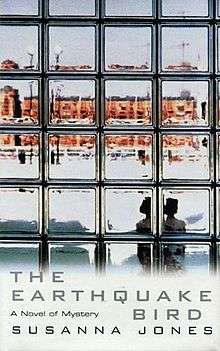The Earthquake Bird
 First edition | |
| Author | Susanna Jones |
|---|---|
| Country | United Kingdom |
| Language | English |
| Publisher | Picador |
Publication date | 2001 |
| Media type | |
| Pages | 224 |
| Awards |
John Llewellyn Rhys Prize Betty Trask Award CWA New Blood Dagger |
| ISBN | 0-330-48501-6 |
The Earthquake Bird is the debut novel by British author Susanna Jones published in 2001. It won the John Llewellyn Rhys Prize a Betty Trask Award and the Crime Writers' Association John Creasy Dagger.[1]
Plot Introduction
The story opens in a Tokyo police station where 34 year old Lucy Fly is being questioned over the murder of her friend Lily Bridges. Lucy has been in Tokyo ten years and is fluent in Japanese and employed in translating manuals into English. She is evasive in her answers to the police but recounts to the readers what led to her current situation; her estrangement from her family back in England, her relationship with Teiji an enigmatic photographer and the recent arrival of Lily, who like Lucy comes from East Yorkshire. On a trip to Sado Island jealousy appears and relationships break down.
Reception
Reviews were generally positive :
- A. N. Wilson in The Telegraph writes "Without giving away the secret, Lucy is obsessed, sexually obsessed, by a young man called Teiji who works in a noodle bar, and who likes taking arty photographs of tall buildings reflected in the puddles of Tokyo's pavements, and of her in the nude. In its spare way, this novel, which I have now read three times, is one of the best accounts - and this is not all that it is - of female sexuality, that subject of and mystery for any male reader. It is not, very decidedly not, a book however which will reveal what "they" feel when in love, or in bed - only what she, and a pretty distinctive she, feels."[2]
- Publishers Weekly concludes "The descriptions of Japan's landscapes, language, people and customs are delivered with fluency and intimacy, yet with the slightly detached clarity of an expat. Some readers may find Jones's intermingling of first- and third-person narration self-conscious and distracting...and the hazy ending raises more questions than it answers. But this is less a whodunit than an examination of the slippery nature of truth and memory, obsessions and betrayals, all of which Jones handles with confidence and skill"[3]
External links
References
- ↑ British Council. "Susanna Jones | British Council Literature". Literature.britishcouncil.org. Retrieved 2016-04-10.
- ↑ 'Shocking prose paired with sexual obsession', The Telegraph, 25 Nov 2002 Retrieved 2016-04-11.
- ↑ www.publishersweekly.com Fiction Book Review Retrieved 2016-04-11.